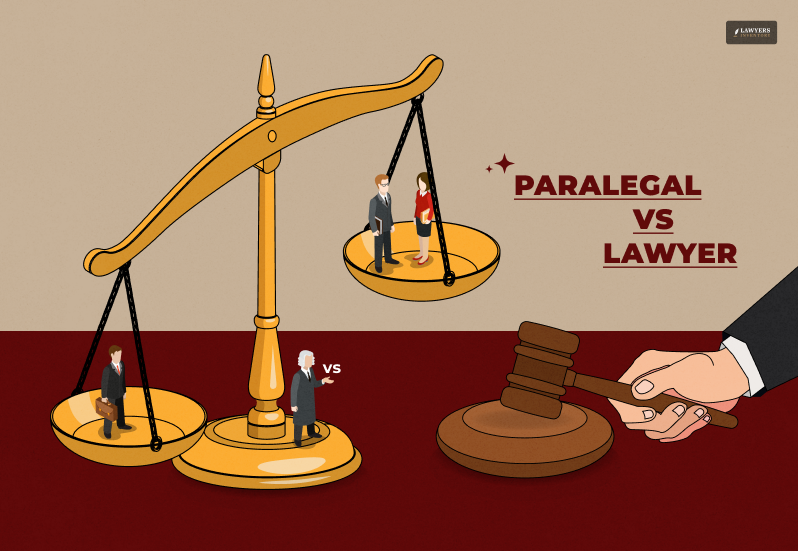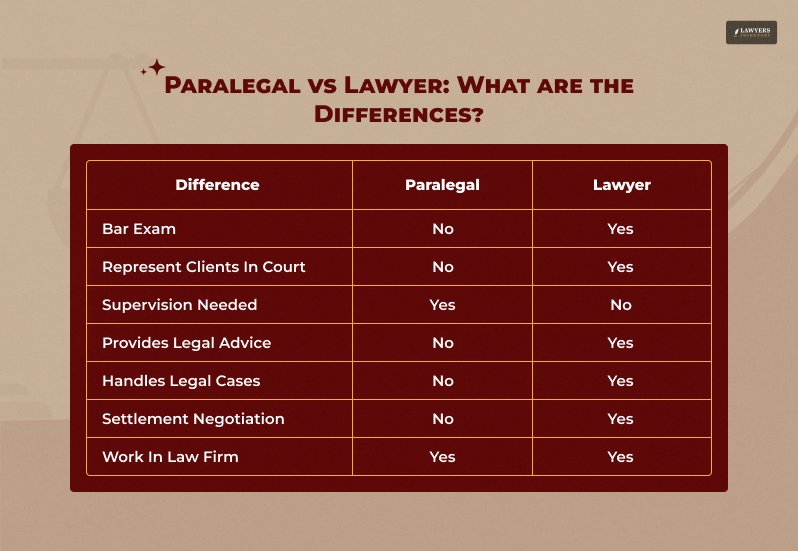
Are you dealing with a legal issue and wondering who to turn to for help? You’re not alone! Many people are unsure whether they need a lawyer or a paralegal.
Both professionals have different jobs, responsibilities, and certifications, even though they can offer legal support. Consider it similar to visiting a doctor’s office; you may see a doctor or a nurse based on your needs.
In the same way, a paralegal may manage simple legal work, but complicated legal matters require the expertise of a lawyer.
I’ll outline the key distinctions between paralegals and attorneys in this blog so you can choose the best option for your circumstances. In addition, I’ll go over their roles, credentials, and best times to hire each so you may decide wisely and obtain the legal assistance you require.
So, keep on reading this blog till the end to learn more…
Paralegal vs Lawyer: Understanding Both the Roles
Regarding legal matters, knowing who to turn to for help is essential. Two professionals who can assist you are paralegals and lawyers. But what’s the difference between them?
In simple terms, paralegals and lawyers work in the legal field but have different roles and responsibilities.
While they can both provide support, they have varying expertise and qualifications. Therefore, understanding their differences can help you decide who to hire for your legal needs.
So, let us take a look at who they are…
What is a Paralegal
An expert who assists lawyers with legal work is known as a paralegal. Put otherwise, they function as the attorney’s right-hand man, helping with things like:
- Looking up cases and laws
- Arranging records and files
- Drafting contracts and court documents
- Speaking with witnesses and clients
Although paralegals are not qualified to practice law like lawyers are, they are trained to carry out certain legal responsibilities.
A lawyer oversees them and provides assessments and approvals for the job they do. Consider a paralegal to be similar to a nurse in a medical facility. Paralegals assist lawyers with legal work in the same way that nurses assist doctors with patient care.
They are essential to the legal team, freeing the lawyer to focus on complex legal issues and court appearances. Furthermore, with their help, legal work gets done efficiently and effectively.
What is a Lawyer
A lawyer, also called an attorney, is a professional who practices law. They are experts in the legal system and help people with legal problems. Unlike a paralegal, a lawyer has the authority to:
- Advise clients on their rights and options
- Represent clients in court and negotiations
- Draft legal documents like contracts and wills
- Interpret laws and regulations
Lawyers have completed law school and passed a bar exam to become licensed. This means they have the authority to practice law and represent clients in legal matters. In contrast, a paralegal works under the supervision of a lawyer.
For instance, consider a lawyer as a doctor for your legal health. Just as a doctor diagnoses and treats medical problems, a lawyer diagnoses and solves legal issues. They use their expertise to advocate for their client’s interests and help them navigate the legal system.
Paralegal vs Lawyer: Are There Similarities?
Although paralegals and attorneys play distinct jobs, they have some parallels. Both deal with legal matters and are employed in the legal industry. In addition, they collect data and carry out research to support their compelling arguments.
Contracts and court filings are among the legal documents that paralegals and attorneys prepare and analyze. They also communicate with clients, specialists, witnesses, and other professionals.
Even with these parallels, there are also important distinctions, which I will be talking about at length below. For instance, lawyers supervise paralegals but have greater training, knowledge, and power.
Thus, you may recognize the important responsibilities that attorneys and paralegals play in the legal system by being aware of their similarities and contrasts.
Paralegal vs Lawyer: What are the Differences?

While paralegals and lawyers play essential roles in the legal system, they are slightly different. Let me show you how:
Education and Training
Firstly, one of the main differences between paralegals and lawyers is their education and training. Lawyers must complete a bachelor’s degree and a law degree (JD) and pass a bar exam to become licensed. Paralegals typically have an associate’s degree or a certificate in paralegal studies.
Authority and Responsibility
Secondly, lawyers have the authority to practice law, represent clients in court, and give legal advice. In contrast, paralegals work under the supervision of a lawyer. They cannot provide legal advice or represent clients in court.
Job Responsibilities
Thirdly, lawyers handle complex legal cases, negotiate settlements, and appear in court. On the other hand, paralegals assist lawyers with research, document preparation, and case management.
Career Path
Finally, lawyers can start their practice, work as in-house counsel, or become judges. Paralegals can work in law firms, government agencies, or corporate legal departments. Still, they can only become lawyers with additional education and training.
Paralegal vs Lawyer: When Do You Need One?
Suppose you need to decide whether you need a paralegal or a lawyer. You might also be confused about what kind of lawyer you need for your case. Or do you even need one in the first place?
In cases like these, it is best that you go to a lawyer first. They can assess your situation and recommend the appropriate level of support.
However, here are some of the cases that you should know about:
Simple Legal Matters
Firstly, a paralegal may be all you need for uncomplicated legal matters. They can help with tasks like:
- Preparing court documents
- Filing paperwork
- Conducting research
- Assisting with document review
Paralegals are a cost-effective option for routine legal tasks.
Complex Legal Issues
For complex legal issues, you’ll need a lawyer. They can:
- Provide legal advice
- Represent you in court
- Negotiate settlements
- Handle complex litigation
Lawyers have the expertise and authority to handle sensitive or high-stakes legal matters.
Specific Situations
In some situations, you may need a lawyer. These include:
- Going to court
- Facing criminal charges
- Negotiating a large business deal
- Drafting a will or trust
In these cases, a lawyer’s expertise and authority are essential.
Ongoing Legal Support
Finally, a paralegal may be a good choice if you need ongoing legal support. They can:
- Assist with document management
- Provide general legal information
- Help with legal research
Paralegals can provide consistent support without the higher cost of a lawyer.
Example: You Have Chosen a Paralegal for a Criminal Case
Imagine this scenario: You’ve been charged with a criminal offense, and you’re feeling overwhelmed. You know you need legal help but want to save money. Therefore, you decide to hire a paralegal instead of a lawyer.
It seems like a good idea at first—paralegals are experienced in legal work, and their fees are much lower. But here’s where things can go wrong.
Paralegals are not licensed to practice law. They can’t represent you in court, provide legal advice, or negotiate deals on your behalf. Their role is strictly supportive—they assist lawyers by researching laws, drafting documents, and organizing case files.
While they are incredibly skilled, they are not qualified to handle the complex nature of a criminal case on their own.
Now, let’s say your case goes to court. You’ll need someone who can argue on your behalf. Furthermore, you need someone who can challenge the prosecution’s evidence and protect your rights.
A paralegal cannot do any of this. Without proper representation, you could miss critical opportunities to defend yourself.
The consequences? You might face harsher penalties, a longer sentence, or even lose your case entirely.
In criminal cases, a lawyer is not just recommended—it’s essential. Lawyers have the expertise to navigate the legal system, build a strong defense, and negotiate plea bargains if necessary. Moreover, they’re trained to anticipate challenges and ensure you get a fair trial.
While paralegals are invaluable to the legal process, they are not a substitute for a lawyer in high-stakes cases like criminal offenses.
Ultimately, trying to cut costs by skipping a lawyer can end up costing you much more in the long run. Therefore, always choose a licensed attorney when facing charges that need proper representation. After all, they are your best chance at a favorable outcome.
Paralegal vs Lawyer: How to Become One?
Do you want to practice law but are having trouble making a decision? Working as a paralegal or lawyer is A fulfilling and difficult career choice.
Though they both function in the legal industry, the roles’ educational, professional, and experience requirements differ.
So, allow me to outline the steps for becoming a lawyer or a paralegal, along with the educational needs, necessary abilities, and certification procedures.
I am going to explain how to begin your legal career is all you need, regardless of whether you want to work in the background as a paralegal or as a courtroom lawyer:
How to Become a Paralegal?
- Education: Earn an associate’s degree or certificate in paralegal studies from a community college or university. Some programs are online.
- Coursework: Study law, ethics, research, and writing. Learn about different types of law, like contracts and family law.
- Training: Gain experience through internships or volunteering at law firms or legal aid organizations.
- Certification: Get certified through organizations like the National Association of Legal Assistants (NALA) or the American Bar Association (ABA). This shows you have expertise.
- Skills: Develop vital research, writing, and communication skills. Learn to work well under pressure and maintain confidentiality.
- Job search: Look for paralegal job openings at law firms, government agencies, or corporate legal departments.
How to Become a Lawyer?
- Education: Earn a bachelor’s degree from a college or university. Any major is okay, but English, history, and government courses can be helpful.
- Law School: Complete a 3-year law degree program (called a JD) at a law school accredited by the American Bar Association (ABA).
- Training: Gain experience through internships, clerkships, or volunteer work in law school.
- Certification: Pass a state bar exam to become licensed to practice law. This shows you have the expertise to be a lawyer.
- Skills: Develop vital research, writing, and communication skills. Learn to work well under pressure and make good decisions.
- Job search: Look for lawyer job openings at law firms, government agencies, or corporate legal departments.
Can Paralegals Become Lawyers?
Many people wonder if paralegals can transition into becoming lawyers.
The short answer is yes—paralegals can become lawyers. However, it requires a commitment to further education and passing specific legal qualifications.
Ultimately, the journey isn’t always easy. However, for those passionate about the law, it’s definitely achievable.
How to Become a Lawyer from a Paralegal?
If you’re a paralegal dreaming of becoming a lawyer, here’s a roadmap to guide you:
- Earn a Bachelor’s Degree: Most law schools require applicants to have a bachelor’s degree. If you don’t already have one, this is the first step. It doesn’t have to be in law. However, relevant fields like political science or criminal justice can help.
- Prepare for the LSAT: The Law School Admission Test (LSAT) is a key requirement for most law schools. Spend time studying and practicing to score well, as it plays a big role in your application.
- Apply to Law Schools: Choose a law school accredited by the American Bar Association (ABA). Highlight your paralegal experience in your application—it’s a valuable asset that sets you apart from other candidates.
- Complete Law School: Law school typically takes three years. As a paralegal, you may already be familiar with some concepts which can make the transition smoother.
- Pass the Bar Exam: After graduating, you’ll need to pass the bar exam in the state where you plan to practice. This is a rigorous test that assesses your knowledge of the law and your ability to apply it.
- Get Licensed and Start Practicing: Once you pass the bar, you’ll be a licensed lawyer.
Is There a Salary Difference?
Yes, there’s a significant salary difference between paralegals and lawyers. For instance, according to the U.S. Bureau of Labor Statistics (BLS):
- Paralegals: The median annual salary for paralegals in 2023 was approximately $60,000. However, this can vary based on experience, location, and the type of law firm.
- Lawyers: Lawyers earn substantially more, with a median annual salary of around $130,000 in 2023. Furthermore, top lawyers in specialized fields or large firms can make much more.
The salary gap reflects the difference in responsibilities, education, and legal authority. While paralegals play a crucial supporting role, lawyers carry the ultimate responsibility for legal advice, court representation, and case outcomes.
If you’re a paralegal considering the leap, it’s worth understanding the financial and professional rewards, as well as the time and effort required. With determination and focus, transitioning from a paralegal to a lawyer is entirely within reach!
Know Which One to Choose!
To sum up, both paralegals and attorneys are vital to the legal system, but their functions are distinct. Knowing the distinctions between the two enables you to select the appropriate one for your particular circumstance.
Paralegals are perfect for basic legal chores, document preparation, and research. Lawyers are also required for professional advice, court representation, and complicated legal matters. If you need assistance choosing a course of action, don’t hesitate to consult a lawyer.
They can evaluate your circumstances and suggest the right amount of assistance. Consequently, you may be confident that you are starting the process of addressing your legal issue whether you select a paralegal or a lawyer.
Knowing which one you need will save time, money, and stress in the long run. Make the right choice, and navigate the legal system with confidence!
Read More:
- Why Trust Litigations Happen and How Hiring an Expert Trust Attorney Helps
- What is an Immigration Attorney and Why Their Role is Important?
- Elder Law Attorney: Expert Guidance for Senior Legal Matters











0 Reply
No comments yet.